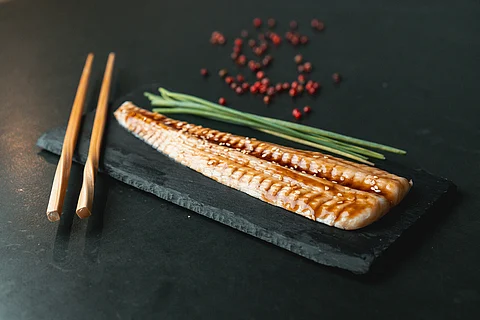

Real image of Steakholder Foods' proprietary plant-based, 3D-printed eel.
Photo: Steakholder Foods.
Steakholder Foods, a leading company in 3D meat and fish printing and cultivated cell technology, has unveiled the world's first plant-based, 3D-printed eel.
The intricate texture of eel is challenging to reproduce, but Steakholder Foods says it has achieved this through precision layering and a unique combination of materials through its proprietary 3D printing technology.
While currently plant-based, the company plans to incorporate cultivated eel cells in the future to enhance authenticity and address cost considerations.
In its announcement, Steakholder Foods said that its printing technology significantly reduces ingredient usage compared to traditional plant-based alternatives, giving the company a potential advantage over competitors.
The company is exploring collaborations to commercialize its 3D-printed eel by providing partners with proprietary 3D printers and ink, aiming for short-term revenue generation. With their technology capabilities, Steakholder Foods believes partners can mass-produce 3D-printed eel at a competitive price, addressing cost challenges associated with global eel prices.
"The launch of our printed eel marks a pivotal moment in the seafood industry, showcasing the vast potential of our DropJet technology – Steakholder Foods' solution for fish and seafood printing," said Steakholder Foods CEO, Arik Kaufman.
"This technology is designed to enable partners to generate products on a potential industrial scale of hundreds of tons monthly, not only at lower costs compared to wild eel, but also with the flexibility to create a variety of printed products using the same production line."
"Such versatility could significantly boost profitability for food companies and lead the way to a shift towards more efficient and sustainable practices in the industry. This product exemplifies the broader possibilities our technology offers our partners," Kaufman added.
The global eel market, valued at USD 4.3 billion in 2022 and growing at a CAGR of 2.19%, heavily relies on wild eel. Challenges such as overfishing, extinction risks, and breeding difficulties in farms highlight the need for sustainable alternatives, the company said.
Steakholder Foods' innovative approach offers a potential solution to these issues, providing an environmentally friendly and economically viable option for the eel market, the company said in a statement.
